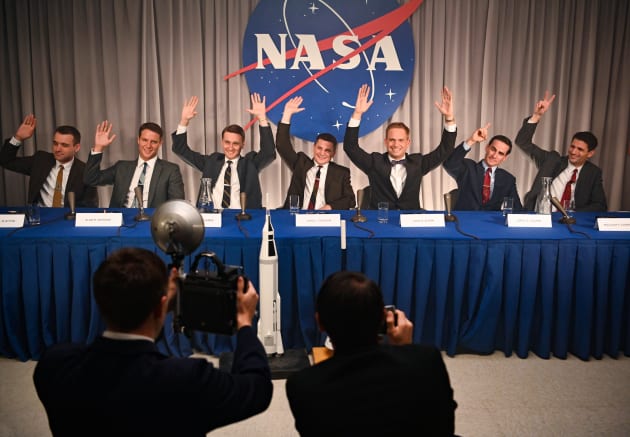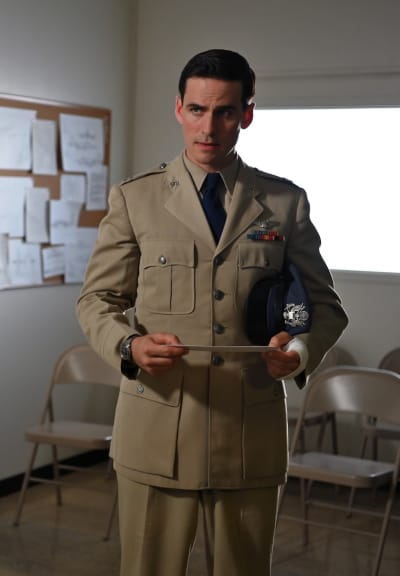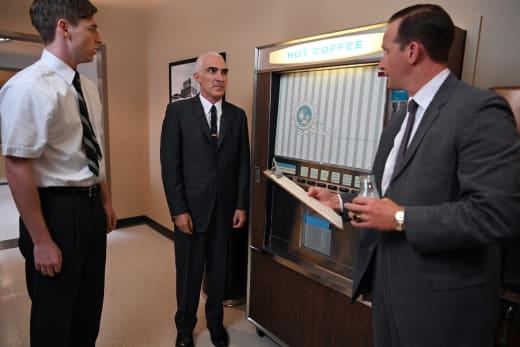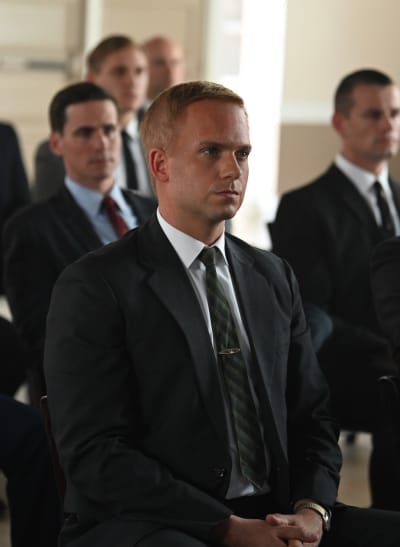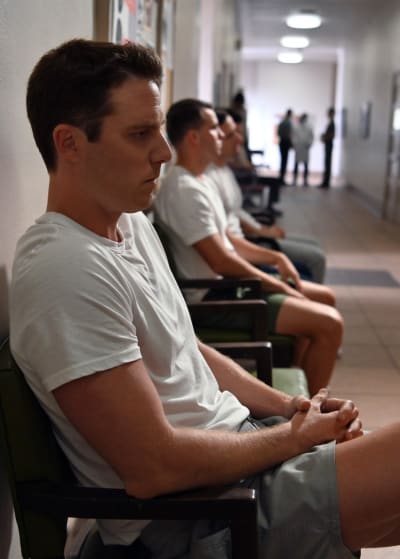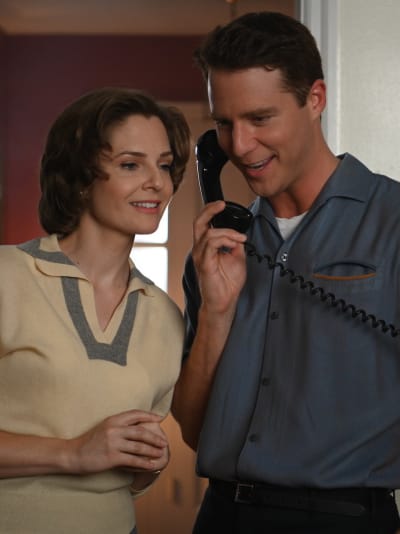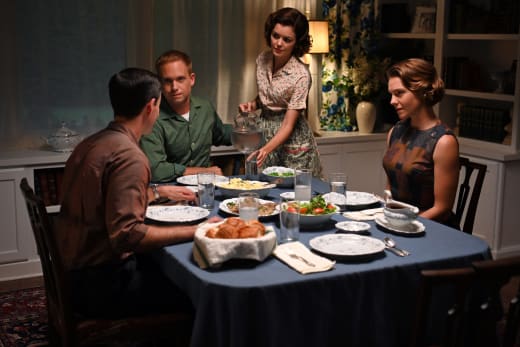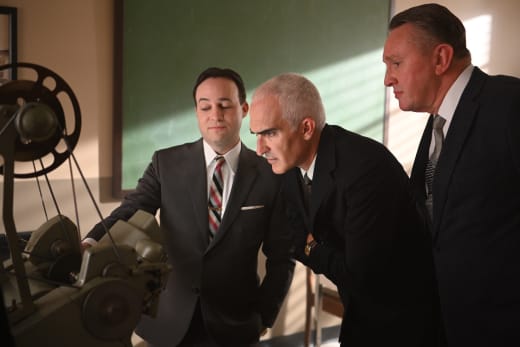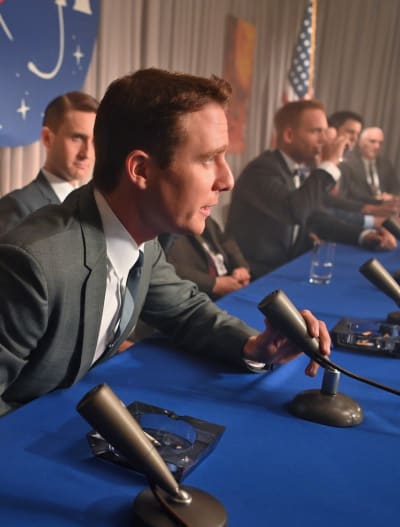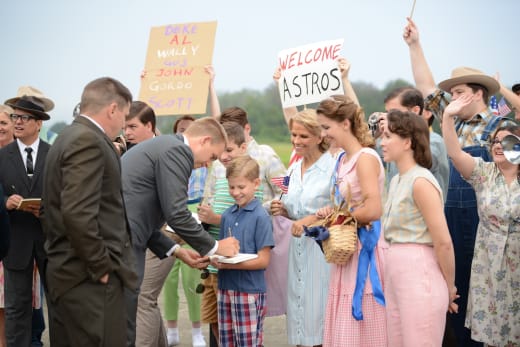Let’s get this out of the way early. I have never seen (or at least I don’t remember seeing) The Right Stuff, the movie, nor have I read the book.
So don’t expect comparisons. From what I understand, the film (and the book on which it is based) is perfection. That’s hard to match let alone conquer.
From my end, that’s good because I can judge this The Right Stuff based solely on its merits.
Despite not seeing one of the greatest space films of all time, the space race is a subject that I find fascinating, and The Right Stuff Season 1 Episode 1 kicked that into high gear with the excitement surrounding the beginning of the space program in the US.
Growing up in a time when the early, lingering effects of the newly appointed astronauts were living a rock star’s existence, many of those on the Mercury Seven were household names.
The Right Stuff Season 1 Episode 2 begins to explore why that’s the case, so the two episodes that dropped today as the premiere to the series, worked very well together.
Never having taken the time to consider how it all came about, it’s hardly surprising that the newly created NASA looked to the military and their courageous and somewhat cowboy-esque test pilots to be the guinea pigs for their program.
Listening to Chris Craft and Bob Gilruth sharing the details of the program with the dozens of men who were competing for the honor wouldn’t have painted a rosy picture for anyone without a bit of daredevil in them, no matter how healthy, intelligent, and personally sound they might otherwise be.
I asked for the a list of the best test pilots in the United States. Well, son, your list is out of date. None of the best test pilots are dead. What we’re doing here has consequences for the entire world. If Russia gets a man into space first, we could lose the cold war, and we don’t have any time for do-overs.
Bob
But the excitement that the notion of getting paid to conquer space inspired in those men was unprecedented. With far more candidates than they imagined would stick around in light of the daunting details, they had quite a job before them.
And the men they were detailing, while very similar (white, protestant military men with sound family lives), were also shockingly different, something that The Right Stuff plays into heavily with its leads, Patrick J Adams as John Glenn and Jake McDorman as Alan Shephard.
Both actors seem perfectly suited to their roles, too, which helps a lot. You don’t want to side with one or the other, but the show begins daring you to choose one almost immediately.
The opening scene of the series set the tone. It’s May 5, 1961, the day that Alan Shephard becomes the first American in space, begins with two of the top astronauts trying to one up each other with everything from their morning runs to their breakfast of champions.
Before we even get to know them, we know there is animosity between them that results from the fierce competition of their profession.
While history tells us that Shephard becomes the first man in space, The Right Stuff tells us that getting there pitted him against John Glenn, one of the world’s greatest pilots and a man who very early earns the favor of everyone around him with his charm.
Patrick’s John Glenn is a kind family man, often seen as an elder to those around him even if they’re generally peers. He has an easy confidence in his skills and with the support of his family, he knows that he can weather any storm.
McDorman’s Alan Shephard is filled with swagger, often putting him perilously close to insubordination in a field where even cowboys need to follow the rules. A handsome womanizer, he doesn’t bask in the same glow of his home life as John does, but it’s his own fault.
Every school kid is going to know the name of the first man in space. His face is going to be everywhere. He’ll never be forgotten. That’s not glory; that’s history.
John
While John wants to prove himself for the impact he could make on history, Alan seems to need to prove himself for some other reason which I can’t quite understand yet.
Alan: No, I’m not going to be one of the seven.
John: You’re not?
Alan: Nope. I’m going to be the first man in space.
John knows the advantages that can be gained from a well-respected public persona, while Alan uses his need for privacy to ward off any intrusion, somehow thinking that the world isn’t watching or that if they are, it doesn’t matter.
Alan: I know what you want. I know what I want.
Wainright: OK, good. So what do you want out of life?
Alan: What do I want most out of life? I want to go fast and be left alone. You write something good. Make me sound heroic, like John Glenn, but not so boring.
It’s in between these two men that all of the others fit.
Gordo Cooper is caught right in the middle of their two worlds. Knowing its importance to the program, he’s desperate to reunite his family after making a mess of his marriage. He’s a brilliant pilot who worries that his wonton behavior helped kill his friend, fellow pilot, Cal, during an exercise.
They are the three astronauts on whom the first two episodes focused the most, and it makes me wonder at the roles the others will play as the season progresses.
Instead of other, lesser known astronauts being in focus, it’s the astronauts’ wives that pull up closest to their counterparts in this regard.
Shannon Lucio is Louise “Lou” Shepard, Alan’s long-suffering wife. She stands by her man but is almost an afterthought to Alan, who flirts and sleeps with any woman he can get his hands on outside of his home.
Wally: To drinking, flying, and screwing.
Alan: As long as the first doesn’t get in the way of the last.
John is soured by that behavior because of how much he loves and relies on his wife, Annie (Nora Zehetner), a kind woman who fights a stammer, something that will make her new life in the public eye a lot harder to endure than the other wives.
And then there is Trudy Cooper (Eloise Mumford), a woman who wants much more out of life than being someone’s wife. A pilot herself, she had already left Gordo but circled around at the possibilities that could arise with Gordo’s opportunity at NASA.
The three women (and the other wives) will ultimately become the greatest friends, a topic that has born fruit on other shows, such as The Astronaut Wives Club and even on the Apple TV+ original series, For All Mankind.
The women are as interesting in this story as the men because of the media circus that upended their lives with the Hollywood treatment given to the astronauts.
With a film actor and a reality show host already presidents of the United States, it shouldn’t come as any surprise to you that before those occurrences, there was a former studio chief at the helm of NASA.
T. Keither Glennan’s role as NASA’s first Administrator thrust the Mercury Seven into the limelight at a time NASA needed to either sink or swim.
Glennan did what he knew best, which took a new agency losing money hand over fist and made them into a cash cow organization by making celebrities of the Mercury Seven and their families.
The cash promised to each astronaut as for the keys to their personal kingdoms far outweighed what they earned as pilots, and the families thought that with LIFE Magazine ultimately getting rights to their story, the media frenzy might die down a bit.
We know that’s unlikely to happen as quickly as they would like, as American’s (and those around the world) were mesmerized by the ordinariness of their new heroes and families. It made them overnight sensations and their lives became open books, whether they wanted it or not.
That could and will spell trouble for many. The Coopers have to keep their marital issues on the downlow if Gordo wants to remain in the program.
Annie has to learn to deal with the public despite her stammer, something that will be easier with new friends and a charming, well-loved husband.
And it’s hard to imagine how difficult things will get for Lou as her husband makes waves with the ladies everywhere he goes.
Sure, he can swing a free car to give a local dealership a horse in the space race, but can he keep swooning women from speaking to the press so that his wife remains in the dark about his behavior?
Alan: I’m a better pilot. That’s all that matters in the end.
Lou: I wouldn’t be so sure.
John’s buttery smooth demeanor wins over all of the press, but Alan’s terse and thoughtless comments don’t bode well for him wooing them to his side if he needs it.
On top of it all, they all need to adapt to a brand new career, forging the path for all who will follow in their footsteps. They’re like kids in college, but they’re middle aged men at the top of their game, putting their lives on the line to compete on the world stage.
It’s pretty heady stuff, and there is so much on the table for the show to explore from the Mercury Seven all the way through today, if the show is to last more than one season.
Despite so many being household names, the members of the Mercury Seven aren’t the first men on the moon. They’re astronaut pioneers, for sure, but the excitement kind of leaves them behind when the stakes get higher.
The fierce competition between John and Alan seems to be the main focus of The Right Stuff, at least right now. The premiere proves that casting is key, and the talented group fit beautifully into their respective roles and offer a worthwhile peek inside the lives of these history-making Americans.
That’s a decent place to start, and hopefully, the others will get a chance to shine as the storylines progress.
The premiere achieved its goal of immersing viewers in the world that ignited our fascination with space and painting a vivid picture of the men and women at the forefront of the new frontier.
We’re looking forward to the remainder of The Right Stuff Season 1 and hope you’ll sitck with us weekly for continuing coverge.
Carissa Pavlica is the managing editor and a staff writer and critic for TV Fanatic. She’s a member of the Critic’s Choice Association, enjoys mentoring writers, cats, and passionately discussing the nuances of television and film. Follow her on Twitter and email her here at TV Fanatic.
